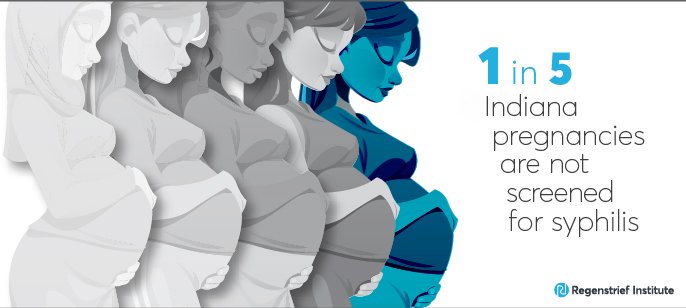As syphilis rates in the U.S. rise, so do cases of congenital syphilis, which is when a mother passes the infection to her baby during pregnancy. Syphilis poses a serious threat to the health of the fetus, potentially causing physical and neurological problems or even fetal death. Timely diagnosis and treatment can prevent harmful outcomes.
A study from the Regenstrief Institute and Indiana University found that even though screening rates have improved, about one in five women still do not receive a test for syphilis during pregnancy. The CDC recommends screening all pregnant women for syphilis during their first prenatal visit.
“The health of mothers and children is a major public health priority, and screenings are an important tool in that effort,” said study author Janet Arno, M.D., professor emeritus of clinical medicine at Indiana University School of Medicine. “Early diagnosis is crucial to improving outcomes for infants, as well as mothers. Left untreated, the impact of the disease can be devastating.”
The research team looked at live births in Marion County, Indiana, from 2014 through 2016. They were able to link birth certificates from the health department with maternal health data from electronic health records in the Indiana Network for Patient Care, created by Regenstrief Institute and managed by the Indiana Health Information Exchange, to create the cohort.
Analysis revealed that over the two-year period:
- 19 percent of pregnancies were not tested for syphilis at any point.
- Testing rates increased from 71.1 percent in 2014 to 86.6 percent in 2016.
“The increase in testing is encouraging, however, this study shows that valuable opportunities to diagnose syphilis are being missed,” said Brian Dixon, PhD, MPA, senior author and director of public health informatics for Regenstrief and IU Fairbanks School of Public Health. “Screening is becoming even more important as cases of syphilis and other sexually transmitted infections rise in the United States.”
“Syphilis testing adherence among women with livebirth deliveries: Indianapolis 2014-2016” is published in BMC Pregnancy and Childbirth. This work was supported by a contract from the U.S. Centers for Disease Control and Prevention [Contract number: 00HCVJDD-2019-32017] and a grant from the U.S. National Library of Medicine [Grant number: T15LM012502].
In addition to Dr. Dixon, other authors on the paper are Opeyemi C. Ojo of Fairbanks School of Public Health; Janet N. Arno, M.D. of IU School of Medicine and the Marion County Public Health Department, and Guoyu Tao, PhD and Chirag G. Patel, D.C., MPH, both of the Centers for Disease Control and Prevention.
About Brian E. Dixon, PhD, MPA
In addition to his role as director of public health informatics for Regenstrief Institute and Indiana University Richard M. Fairbanks School of Public Health at IUPUI Brian E. Dixon, PhD, MPA is a research scientist at Regenstrief and an associate professor of epidemiology at the Fairbanks School of Public Health. He is also an affiliate scientist at the U.S. Department of Veterans Affairs Health Services Research and Development Center for Health Information and Communication, Richard L. Roudebush VA Medical Center.
About Regenstrief Institute
Founded in 1969 in Indianapolis, the Regenstrief Institute is a local, national and global leader dedicated to a world where better information empowers people to end disease and realize true health. A key research partner to Indiana University, Regenstrief and its research scientists are responsible for a growing number of major healthcare innovations and studies. Examples range from the development of global health information technology standards that enable the use and interoperability of electronic health records to improving patient-physician communications, to creating models of care that inform practice and improve the lives of patients around the globe.
Sam Regenstrief, a nationally successful entrepreneur from Connersville, Indiana, founded the institute with the goal of making healthcare more efficient and accessible for everyone. His vision continues to guide the institute’s research mission.
About the Richard M. Fairbanks School of Public Health
Located on the IUPUI and Fort Wayne campuses, the Richard M. Fairbanks School of Public Health is committed to advancing the public’s health and well-being through education, innovation and leadership. The Fairbanks School of Public Health is known for its expertise in biostatistics, epidemiology, cancer research, community health, environmental public health, global health, health policy and health services administration.










